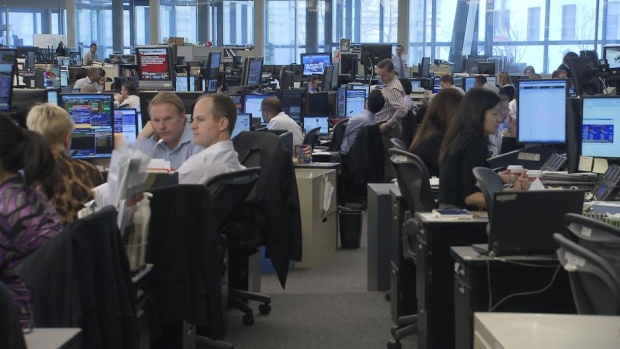Mar 29, 2017
TSX overvalued, vulnerable to a correction: Reuters poll
, Reuters

Canada's main stock index will post modest gains but still reach a fresh all-time high by the end of 2017, a Reuters poll found, but some investors worry the index is overvalued and vulnerable to a correction.
Median forecasts from the poll of more than 20 portfolio managers and strategists were for the Toronto S&P/TSX composite index to rise 3 per cent to 16,000 by the end of 2017 from Tuesday's close of 15,598.57, eclipsing the record high of 15,943.09 set in February.
It rose 17.5 per cent in 2016 and has more than doubled from a trough in March 2009, set during the global financial crisis, and is expected to climb by mid-2018 to 16,470.
"The equity rally is eight years old but rallies don't die because of old age, they end because of recessions," said Ben Jang, portfolio manager at Nicola Wealth Management.
A recent pick-up in the global economy could help support Canada's commodity-linked stock market, while domestic growth has also strengthened. Also, last week the government held off from raising taxes on investors in its budget.
Investors had worried increased taxes on capital gains and dividends would reduce the competitiveness of Canada's businesses, just as the administration of U.S. President Donald Trump focuses on trade deals and tax reform.
Trump's administration last week approved TransCanada Corp's (TRP.TO) Keystone XL pipeline, which would bring more than 800,000 barrels of heavy crude per day from Canada's oil sands to U.S. refineries and ports along the Gulf of Mexico.
But Canada, which sends about 75 per cent of its exports to the United States, could suffer badly if the North American Free Trade Agreement is renegotiated or the United States implements a border adjustment tax.
Asked about the TSX's valuation, 10 of the 15 analysts that responded in the past week said the index is overvalued, while nine of the 15 said it is likely to suffer a 10 per cent correction by the end of 2017.
Some analysts are cautious after U.S. crude oil prices pulled back recently below US$50 a barrel, pressured by record high U.S. inventories and uncertainty over whether a production cut led by the Organization of the Petroleum Exporting Countries will be extended beyond June.
The energy group accounts for more than 20 per cent of the TSX's weighting, while financials have an even heavier weighting at more than one-third.
Earlier in March, the country's major banks attracted increased scrutiny of their sales practices, which the banks have defended.
"Banks are looking toppy ... failing to respond to positive earnings and with attitudes toward banks souring as Canadians realize that big earnings and dividend growth have been built on aggressive sales tactics," said Colin Cieszynski, senior market analyst at CMC Markets Canada.
Other investors worry geopolitical risks or weakening of China's economy could weigh on the TSX.
"Our housing market is partially dependent on Chinese capital and if it flees because of problems on the mainland it would probably coincide with a significant downdraft in commodity prices, hurt by lack of demand in China," said Matt Skipp, president of SW8 Asset Management.
He expects the index to fall around 10 per cent from current levels by mid-2017 before recovering all of its losses by mid-2018 as the economic policies of Trump "start to gain traction."







